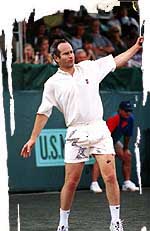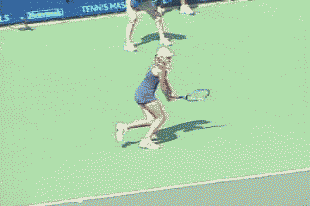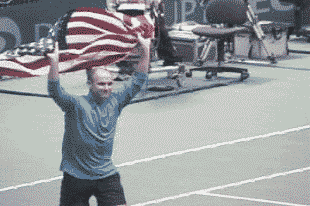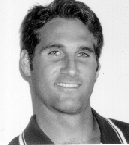|
Mental Toughness
While some anger has proven to actually improve
performance in specific instances, there are many more examples where it
has been destructive. First, let’s examine the origin of anger in match
play and you can decide for yourself what is most beneficial for you. Typically, anger on the court is caused by a threat
to one’s ego. For example, when a player makes mistakes at critical
times in a match or is losing—the most common sources of anger on the
court—there is an instant recognition of momentary “failure.” That
is, their expectations are mal-aligned with their current reality. This
creates tension and anxiety, which often lead to anger on the court. But
we must be careful not to assume and label this type of reaction as
entirely negative unless we observe a negative impact on a player’s
performance. Often when the anger levels have reached a critical point,
players will either begin over hitting, tanking, or make making more
mistakes, which only fuels the anger pump even further. As the player’s
arousal level rises, fluid strokes with proper biomechanics, effective
strategy, and mental calmness become almost impossible to maintain. Why, then do we see some athletes actually performing
at even higher levels when it is obvious that they are angry? To answer
this question let’s observe the following scenario.
Jim is playing somebody whom he knows he can beat.
But in this particular match he is down 4-3 in the first set and, from his
perspective, playing rather poorly. At ad-out, after a long rally, he
misses a relatively easy forehand (his strength) and goes down 5-3. Upon
missing the forehand, Jim becomes incensed. He angrily screams to the
Heavens, “God, c’mon. Let’s go.” But the scream has elements of
extreme competitiveness in it. It has a different quality to it; not
defeated or hopeless, but determined and competitive. Jim is absorbed in
the match, pouring his heart out on every point, and challenging himself.
As you watch Jim play the next point after this outburst you notice that
he plays even more aggressively. You will not hear another outburst from
Jim for quite awhile, probably not until there is another important point
that he badly wants. In the above scenario, Jim is unaffected by his “passing” anger. Rather, the emotion is a reflection of his desire to play well and win, not of lasting disappointment and despair. In fact, Jim may even play better due to a rise in intensity, which makes him move his feet more aggressively and go for his shots. If he can maintain this level of intensity and focus throughout the match without having it get too high, he may play even better. However, in most instances, emotional outbursts
actually contaminate a player’s overall quality of play, affecting
subsequent points and match results. In the final analysis, it boils down
to the quality of the anger, which is either fueled by challenge or by
mal-aligned expectations and despair. If it is the ladder of the two, the
problem is no longer a psychological one. It becomes a physical issue.
When players become angry and negative the body responds with a
“flight or fight” response sending a chemical known as cortisol to the
brain, which creates muscle tension. And we all know what muscle tension
does to our strokes.
The ultimate question you have to ask yourself is
whether your emotional reactions on the court, especially anger, hurts or
helps your performance. If it is hurting your performance then you need to
take steps to improve your reaction on the court. Identifying your
negative self-talk, understanding your beliefs around errors and losing,
and replacing these thoughts and beliefs with more productive ones, will
improve your game. Of course, this takes of honesty and a willingness to
focus on your shortcomings. Make a goal for yourself, to breathe and
re-focus your energy on the next point in a practice match this week. The best mentality on the court is when players are
so focused and absorbed in competition, having fun, and going for there
shots, that anger becomes highly unlikely because of their involvement in
the flow of their movements. As the pros often (though not always)
demonstrate, errors are a natural part of any match. They don’t become
overly preoccupied with their winning passing shots—unless it is a
critical point—nor do they blow up on their missed opportunities. Their
shots, points, and match results unfold over the course of the match and
they are keenly aware how their composure and reactions impact the
momentum of every match. When you hit the court take your high energy and competitiveness and channel it into every point. Keep the negative emotions out of the arena. When you get absorbed into the joy of hitting the ball and relishing the opportunity to challenge yourself, you will take your game to a higher level. TennisONE is an informational and instructional Website. Your feedback is important to us. Let us know what you think and what you’ve learned by emailing us here at TennisONE.
Jeff Greenwald is currently ranked #1 in the world in both singles and doubles in the men’s 35 age division and #1 in the United States in that age division by the International Tennis Federation and the United States Tennis Association respectively. In 1997, he was the #1 ranked tennis player in Northern California and was named Player of the Year by the USTA. Earlier, Jeff earned a world ranking as a touring professional (he is still ranked on the ATP computer), competing in scores of tournaments on seven continents. Jeff trained as a youth with John Austin and the late Tim Gullikson. He continues to compete in professional tennis tournaments worldwide, employing and testing the techniques and behavior patterns he teaches in classrooms, boardrooms, and on the playing fields. Jeff holds a Master's Degree in Clinical and Sports Psychology, is a USPTA certified tennis professional, and is a member of the National Speakers Association. Readers are encouraged to email their thoughts to the author at jeff@mentaledge.net.
|
Last Updated 4/15/00. To contact us, please email to: webmaster@tennisone.com TennisONE is a registered trademark of TennisONE and SportsWeb ONE; Copyright 1995. All rights reserved. |
||||||




